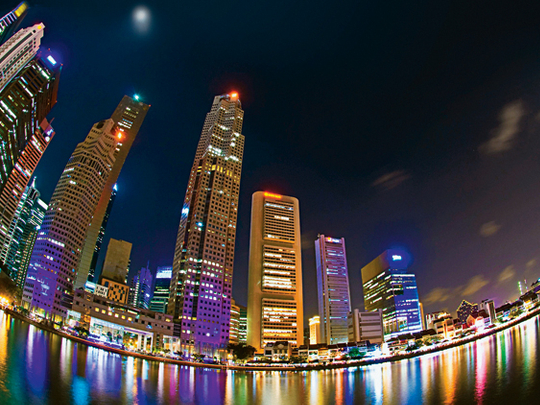
Singapore is undoubtedly a ‘wealth centre' of the world. Apart from an astounding density of resident millionaires, and contra-recession gusto in economic growth, its wealth management industry continues to prosper even as contemporaries grapple with trouble. In seemingly effortless fashion, Singapore's private banks have been doing excellent business, and the value of managed private wealth increases significantly every year. Singapore's central bank says that more than half the managed money comes from outside Asia Pacific, although this includes pension funds and hedge funds in addition to private banking.
The Monetary Authority of Singapore (MAS) estimated assets under management at $900 billion (Dh3,305 billion) at the start of 2010 — the highest in Asia and up about 40 per cent from a year earlier. The Boston Consulting Group estimates that private banks alone manage about S$500 billion (Dh1,488 billion) in assets.
Sharad Nair, Executive Director, Julius Baer Singapore, personally manages the wealth of several international high net worth investors. A resident of Dubai for 14 years before relocating to Singapore, he is in awe of Singapore's rules. "The regulatory environment in Singapore is among the finest. It has one of the best standards in the world, but at the same time, it engages industry and is consultative, not intrusive," he points out.
The creation of the Wealth Management Institute (WMI) by MAS and the Singapore Workforce Development Agency ensures a constant output of trained professionals through accredited training and assessment programmes. The MAS' Macroeconomic Review of April 2011 states that Singapore's financial services sector turned in a strong performance in Q4 2010, rising by 16.9 per cent. The sentiment-sensitive cluster saw the largest improvement, accounting for a large proportion of growth in Q4. The MAS also endorses the recent launch of a Code of Conduct (PB Code) for the private banking industry in Singapore by the Private Banking Advisory Group.
New insurance policy
The new Deposit Insurance and Policy Owners' Protection Schemes Act 2011(DI-PPF Act), comes into effect this September. It will see insurance coverage expanded from individuals and charities to include deposits of sole proprietorships, partnerships, companies and unincorporated entities. Insurance coverage limit has been raised from $16,143-$40,360 per depositor, catapulting fully insured depositors to a healthy 91 per cent. Lim Hng Kiang, Minister for Trade and Industry and Deputy Chairman of MAS, says: "This will mitigate potential cash flow problems in the event of a bank failure and is in line with the primary objective of protecting small depositors."
Singapore is acclaimed for the MAS' Financial Investor Scheme (MAS FIS). Eligibility for permanent residency in the country is now open to investors who are able and willing to invest $8.07 million in financial assets, or $6.45 million in financial assets and the rest in residential property in Singapore.
"Singapore is determined to attract some of the world's wealthiest people to its shores. It has the right attractions, and their plan is certainly in progress," adds Sharad Nair.
It may be a while before Singapore surpasses Switzerland in the value of managed wealth, but growth continues abated.


